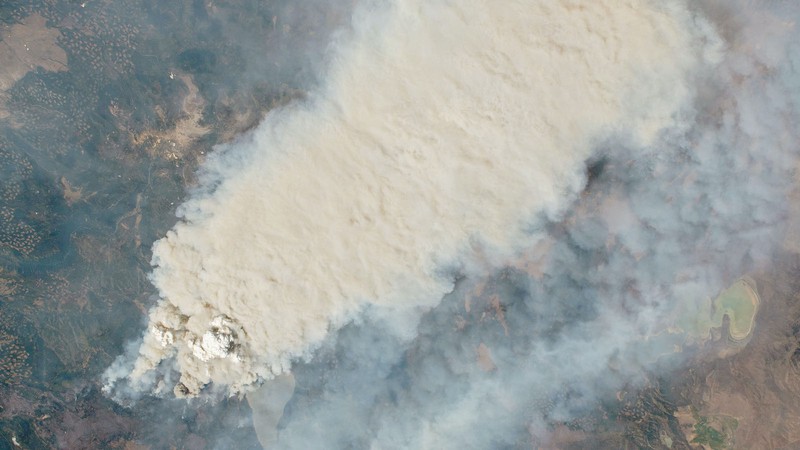
The Dixie Fire, as seen from a NASA Satellite on August 4. NASA Earth Observatory Public Domain
The massive Dixie Fire as of Monday had burned almost 490,000 acres, or about 765 square miles, in Butte and Plumas counties, after blazing through another 16,000 acres on Saturday night alone. The wildfire, described as “a monster” by a California Department of Forestry and Fire Protection spokesperson, destroyed more than 400 homes and buildings by Monday, according to a Bay Area News Group report by Rick Hurd.
The fire, seen above in a NASA satellite photo taken Aug. 4, had left eight people missing.
Now, a federal judge is demanding to know what California’s largest power company knows about how the fire started. Though the cause of the Dixie Fire has not been officially determined, Pacific Gas and Electric filed an incident report with the state appearing to admit that its equipment set off the spark that started the blaze on July 13, near the Cresta Dam in Plumas County.
Then, on Aug. 2, PG&E filed another incident report with the California Public Utilities Commission, which indicated that the company’s equipment may have also been the cause of a second fire, known as the Fly Fire, which merged with the Dixie Fire on the weekend of July 24 to create a single, monstrous inferno.
The Fly Fire ignited on July 22, scorching about 4,000 acres before merging with the Dixie Fire. PG&E’s incident report stated that shortly after smoke was spotted by fire surveillance camera in the area, a fallen tree was found in contact with a power line called the Gansner 1101 circuit “in the area of Butterfly Valley Twain Road and Highway 70 in Plumas County.”
On Aug. 6, United States District Court Judge William Alsup, of the California Northern District, ordered PG&E to hand over any drone video footage of the area where the Dixie Fire started, including images that show the tree—believed to be a Douglas fir—that was leaning against a power line causing two fuses to blow, according to PG&E’s report on that incident.
But that wasn’t all the judge demanded of the power company.
“Please identify each fire that PG&E started, or is suspected to have started, this wildfire season,” Alsup instructed the company, giving it a deadline of Aug. 16 to hand over the materials, according to a Bay Area News Group report.
PG&E equipment has a long history of starting California wildfires. Most notoriously, a damaged PG&E power line sparked the deadly 2018 Camp Fire which claimed 81 lives. According to data from the CPUC compiled by the Sacramento Bee, PG&E equipment failures were behind 1,552 fire incidents from 2014—when the state first started requiring power companies to file fire incident reports—to 2017.
That number was not only more than any other power company in the state, it was a lot more. The next worst offender was the state’s second-largest power company, Southern California Edison, which reported just 347 incidents in the same time span. SoCal Edison serves 15 million customers, compared to 16 million for PG&E.
In terms of fires started per 100,000 customers, however, San Diego Gas and Electric was actually second-worst in the state, but still far behind PG&E, with three fires per 100,000 customers. PG&E reported 10 fires per 100,000 customers.
From 2015 to 2018, fires started by PG&E equipment killed 109 people, including the 85 who died in the Camp Fire. The October wildfires of 2017 killed 22 people, and were set off by PG&E power line failures. The Butte Fire in 2015 killed two people, and was sparked by a tree striking a PG&E power line.
Short articles summarizing reporting by local news sources with linkbacks to the original content.